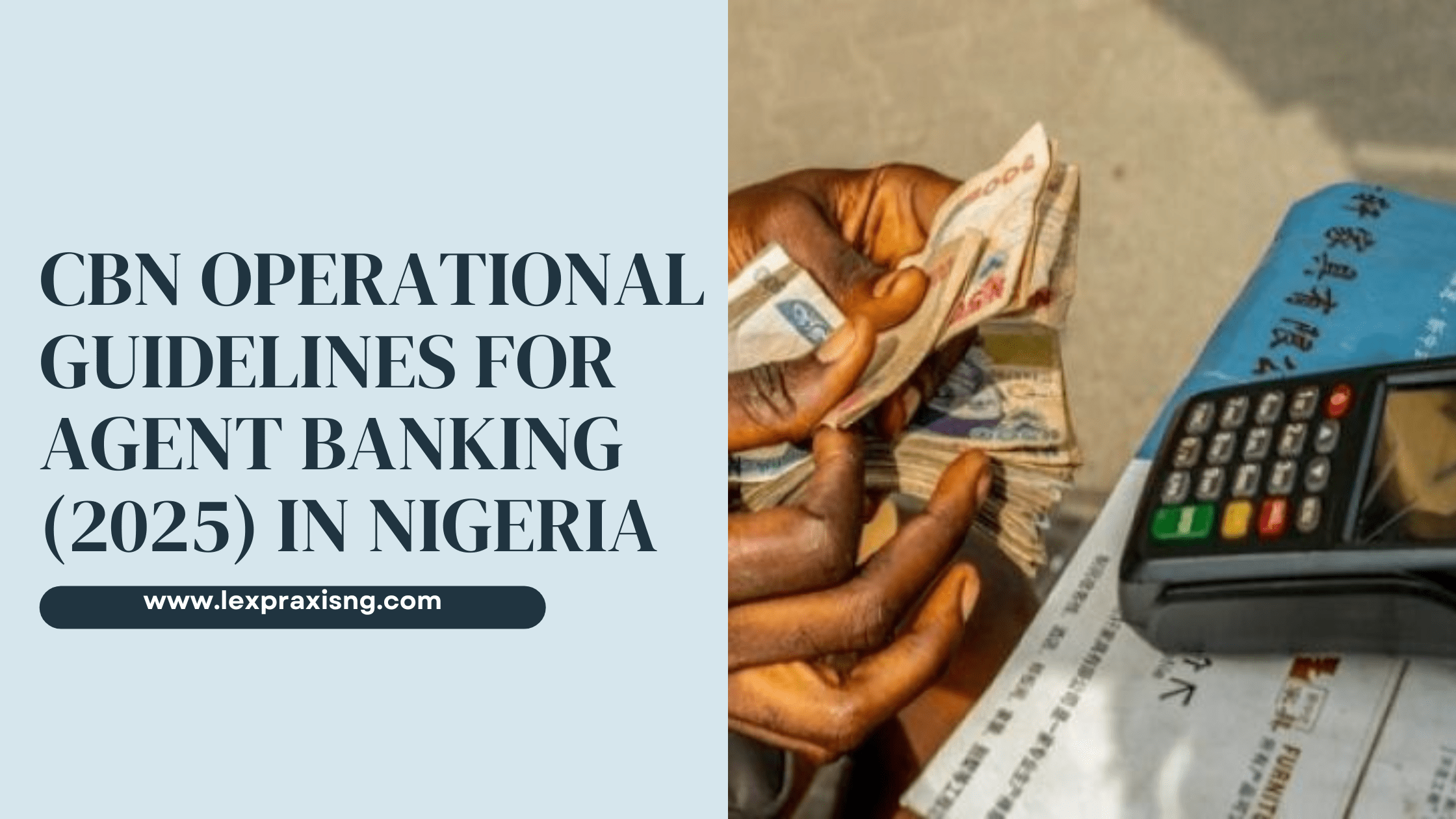On the 6th of October, 2025, the Central Bank of Nigeria published a new set of comprehensive guidelines on agent banking (i.e, Guidelines for the operations of Agent Banking in Nigeria). The introduction of this guideline is targeted at establishing minimum standards for operating agent banking in Nigeria, enhancing agent banking to provide financial services and promoting financial inclusion, encouraging responsible market conduct, and improving service quality in agent banking operations. The Guideline consolidates and supersedes previous agent banking instruments released in 2013 and 2015. This article will explore the key changes introduced by the new guidelines and their impact on agent banking in Nigeria.
Key Reforms of the new Guideline for the operations of Agent Banking in Nigeria
1. Consolidation of prior rules into a single instrument
The 2025 CBN guideline on agent banking consolidates and replaces the 2013 Agent Banking Guidelines and related super-agent licensing rules of 2015, reducing fragmentation and setting a single source of regulatory obligations. This matters because earlier practice based on piecemeal circulars must be reconciled to the new guideline.[1]
2. Introduction of new limits and transaction controls, and cash caps
The Guidelines introduce explicit caps for cumulative agent cash-out activity. In other words, the guideline has now set the minimum and maximum thresholds at N100,000 for both cash deposits and withdrawals daily and N500,000 weekly.[2] Principals are to ensure that the cumulative daily withdrawal of each agent does not exceed N1,200,000.[3] In addition, principals must implement real-time monitoring and ensure agents do not breach the caps, with record-keeping and reporting obligations falling squarely on the principal.
3. Mandatory Dedicated Agent Wallet or Account
For enhanced visibility, all agent banking transactions must be conducted exclusively through a designated agent account or wallet maintained with the principal financial institution. This account serves as the official channel for recording, reconciling, and monitoring all agent activities. Any transaction carried out outside or independent of the approved agent account is deemed a regulatory breach and a violation of the Central Bank of Nigeria’s Guidelines for the Operations of Agent Banking 2025.[4]
4. Stricter Conditions of Eligibility
The guideline outlines stricter conditions for eligibility as an agent by providing for persons who are disqualified from becoming agents. These persons or entities include those whose BVN has been blacklisted, individuals or entities with non-performing loans, persons below the age of 18, undischarged bankrupts, companies that have filed for insolvency, as well as persons convicted of a felony, fraud, dishonesty, and other related offences.[5]
5. Agent’s Streamlined partnership with one principal financial institution
One of the most profound operational changes is the requirement that agents (including POS operators) be exclusive to one Principal only, and they can only belong to one network of super-agents at any given time (bank, mobile-money operator, PSB, microfinance bank, or licensed super-agent).[6] Although the Guideline has been published, the changes will be effective from April 1, 2026, thereby allowing a window of awareness and transition.
6. Tightened KYC/agent-onboarding, reporting, and accountability obligations for principals and super-agents
The Guidelines tighten Know-Your-Agent (KYA) standards and further require dedicated transaction accounts for agents, stronger transaction surveillance, and biometric identifiers where available.[7] Additionally, it explicitly establishes AML/CFT accountability measures; in other words, principals are responsible for agent conduct and must implement transaction monitoring that feeds suspicious-activity reporting frameworks.[8]
7. Clarification of contractual obligations between stakeholders
The Guidelines clarify supervisory responsibilities between principals and licensed super-agents, including the requirement that principals maintain oversight, training, dispute resolution, and liquidity protocols. The legal relationship and on-paper allocation of liability must be reflected in updated agent agreements and service-level arrangements.[9]
How does this affect parties involved in agent banking operations?
a. Principal liability for agent misconduct: Enforcement will focus on principals who fail to supervise agents, especially where weak KYA/KYC or poor transaction monitoring enables fraud or ML/TF activity.[10]
b. Breach of exclusivity and market-structure disputes: Transition management (agents switching principals without formal notification) may create commercial disputes. Therefore, Principals have a responsibility to address transition, indemnities, and termination in contracts. [11]
c. Data protection and privacy exposure: Expanded biometric and customer-data collection raises Nigeria Data Protection compliance issues. Agents are to ensure DPIAs, retention policies, and lawful bases for processing are in place.
Conclusion
The 2025 CBN Agent Banking Guideline tightens Nigeria’s agent-banking rules at a critical moment in the payments market to preserve financial inclusion gains while closing vulnerabilities to fraud and illicit finance. Therefore, it is recommended that banks, fintechs, and super-agents revise contracts, update AML/KYC frameworks, harden data protection controls, and prepare firms for the implementation of the new rules in order to eliminate regulatory and commercial friction and preserve client reputations as the new rules come into force.
For enquiries, you may contact us through the WhatsApp icon on this page or send an email to [email protected], and we’ll attend to you.
[1]https://www.cbn.gov.ng/Out/2025/CCD/CIRCULAR%20AND%20GUIDELINES%20FOR%20THE%20OPERATIONS%20OF%20AGENT%20BANKING%20IN%20NIGERIA%20OCTOBER%206%202025.pdf
[2] Rule 11 CBN Guideline for the Operation of Agent Banking in Nigeria
[3] ibid
[4]Rule 10.1 CBN Guideline for the Operation of Agent Banking in Nigeria, https://businessday.ng/news/article/10-things-pos-agents-need-to-know-under-cbns-new-guideline/
[5] Rule 7.2 CBN Guideline for the Operation of Agent Banking in Nigeria
[6] Rule 4.2 CBN Guideline for the Operation of Agent Banking in Nigeria
[7] Rule 8.3 and 8.4 CBN Guideline for the Operation of Agent Banking in Nigeria
[8] Rule 10.6, 10.7 and 10.8 CBN Guideline for the Operation of Agent Banking in Nigeria
[9] Rule 9.1.2 and 9.3 CBN Guideline for the Operation of Agent Banking in Nigeria
[10] Rule 9 CBN Guideline for the Operation of Agent Banking in Nigeria
[11] Rule 10 CBN Guideline for the Operation of Agent Banking in Nigeria
